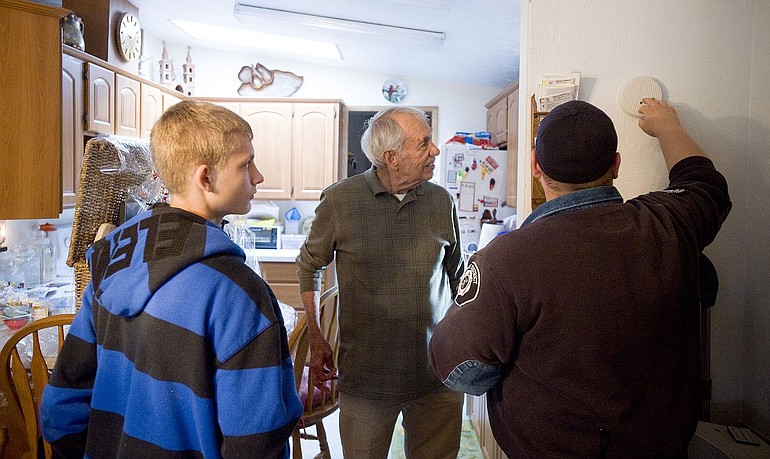Ninety-six percent of American homes have smoke detectors, but not all of them work.
Local firefighter Travis Dick found one of them Saturday morning; then he learned why the alarm failed to squeal when he pushed the test button.
“No battery,” said Dick, of Fire District 6.
And how did that happen? After it had gone off accidently, the home’s occupant took the battery out of the smoke detector to prevent further nuisance alarms, she told the firefighter.
Dick replaced the battery and advised the woman to keep the smoke detector powered up.
Fire District 6 offers these tips for making sure smoke alarms are maintained and working properly:
Fire District 6 offers these tips for making sure smoke alarms are maintained and working properly:
o Use the smoke alarm's test button at least once a month and make sure everyone in your home knows the sound.
o An alarm "chirps" a warning when the battery is low; replace it right away.
o Replace all smoke alarms -- including alarms that use 10-year batteries and hard-wired alarms -- when they're 10 years old (or sooner) if they do not respond properly when tested.
o Never remove or disable a smoke alarm.
o Use the smoke alarm’s test button at least once a month and make sure everyone in your home knows the sound.
o An alarm “chirps” a warning when the battery is low; replace it right away.
o Replace all smoke alarms — including alarms that use 10-year batteries and hard-wired alarms — when they’re 10 years old (or sooner) if they do not respond properly when tested.
o Never remove or disable a smoke alarm.
That alarm check was part of a fire-safety project at a Hazel Dell senior neighborhood. Fire District 6 joined with volunteers from the Salmon Creek Lions Club and Paul Davis Restoration to test alarms, install smoke detectors and replace batteries at Meadow Verde Mobile Home Park, just off Northeast 99th Street.
“We’ve been doing these for a long time,” said Dawn Johnson, the district’s public information officer. “We focus on seniors because they have the highest risk of fire death. It’s harder for them to get out of their homes, and they have a more difficult time checking their smoke alarms.”
“This is such a great service,” said Meadow Verde resident Agnes Alexander, a repeat client. “The last time, they put in two new smoke detectors, including one in the bedroom.”
o In an ionization smoke detector — the more common and less expensive variety — a small electric current runs between two plates in the ionization chamber. When smoke disrupts the current, the detector senses it and sets off the alarm.
o About 2,600 people died in residential fires in 2009, according to the U.S. Fire Administration, part of the federal Department of Homeland Security.
o In an ionization smoke detector -- the more common and less expensive variety -- a small electric current runs between two plates in the ionization chamber. When smoke disrupts the current, the detector senses it and sets off the alarm.
o About 2,600 people died in residential fires in 2009, according to the U.S. Fire Administration, part of the federal Department of Homeland Security.
o While most homes have smoke detectors, 63 percent of home fire deaths from 2003-2006 were in homes without smoke alarms (40 percent) or where the alarms didn't work (23 percent), according to the National Fire Protection Association.
o While most homes have smoke detectors, 63 percent of home fire deaths from 2003-2006 were in homes without smoke alarms (40 percent) or where the alarms didn’t work (23 percent), according to the National Fire Protection Association.
In addition to replacing batteries and testing alarms during Saturday’s visit, the volunteers installed a new smoke alarm in another bedroom.
Firefighter Shawn Richey said he’s done mop-up work after helping extinguish a residential fire, getting things ready for investigators.
“I’ve opened the smoke detector battery door, and most of the time it’s empty,” Richey said.
It’s not an unusual story. According to the nonprofit National Fire Protection Association. in more than half the reported home fires where the smoke detector didn’t sound an alarm, it was because the battery was missing or disconnected. The biggest reason for disconnecting the battery was nuisance alarms. Some missing batteries get “borrowed” by youngsters whose battery-powered gadgets run out of juice.
About 22 percent of smoke-alarm failures were due to dead batteries.
“But I’ve seen the positive side, too,” Richey continued. “There was a fire awhile ago: The family was sleeping, the alarm went off, and all the people made it out safely. They called 911 and we got there before the structure was destroyed.”
More than half of all fire alarms occur when people are sleeping, Johnson said. The occupants realize they’re in danger only when the alarm goes off.
Firefighters weren’t the only participants in Saturday’s project with backgrounds in fire-safety issues. Bobbie Gunderson works for the company that donated money to buy 100 smoke detectors. Paul Davis Restoration is in the disaster-response business, and Gunderson has cleaned up after a lot of fires.
“I’ve seen more candle fires,” Gunderson said.
Add things like Christmas lighting and people plugging in space heaters as temperatures drop, and “we’ll start getting busy,” Gunderson said.
Dan Bodell, with the Salmon Creek Lions Club, offered a different perspective. He had noticed a report of a fire in a washroom at a nearby RV park awhile ago, and realized his group’s role in preventing more extensive damage.
“That was where we had put in a smoke detector,” Bodell said.
Tom Vogt: 360-735-4558 or tom.vogt@columbian.com.




